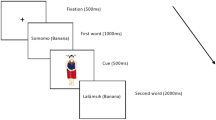Abstract
Previous studies have found that bilinguals differ in their response times on the bilingual version of Stroop Task. Automaticity and control and Language proficiency have emerged as important factors that lead to differences in the response time. This study aimed to understand Stroop Effect in Hindi-English bilinguals on the computerized version of Hindi and English language Stroop task. The study was conducted on 42 Hindi–English bilinguals. All were more proficient in the Hindi language as compared to the English Language. Results of the study revealed greater Stroop Effect in the English language as compared to the Hindi language.
Similar content being viewed by others
References
Abutalebi, J., & Green, D. (2007). Bilingual language production: The neurocognition of language representation and control. Journal of Neurolinguistics, 20(3), 242–275.
Bialystok, E. (2009). Bilingualism: The good, the bad and the indifferent. Bilingualism: Language and Cognition, 12, 3–11.
Bialystok, E., & Craik, F. I. (2010). Cognitive and linguistic processing in the bilingual mind. Current Directions in Psychological Science, 19(1), 19–23.
Blumenfeld, H. K., & Marian, V. (2007). Constraints on parallel activation in bilingual spoken language processing: Examining proficiency and lexical status using eye-tracking. Language and Cognitive Processes, 22(5), 633–660.
Cedrus Corporation. (1990). SuperLab Manual. Cedrus Corporation. https://www.cedrus.com/superlab/manual.htm. Accessed 12 July 2018.
Costa, A., La Heij, W., & Navarrete, E. (2006). The dynamics of bilingual lexical access. Bilingualism: Language and Cognition, 9(2), 137–151.
Dalrymple-Alford, E. C. (1968). Interlingual interference in a color-naming task. Psychonomic Science, 10(6), 215–216.
De Groot, A. M., Delmaar, P., & Lupker, S. J. (2000). The processing of interlexical homographs in translation recognition and lexical decision: Support for non-selective access to bilingual memory. The Quarterly Journal of Experimental Psychology Section A, 53(2), 397–428.
Dyer, F. N. (1971). Color-naming interference in monolinguals and bilinguals. Journal of Verbal Learning and Verbal Behavior, 10(3), 297–302.
Ehri, L. C., & Ryan, E. B. (1980). Performance of bilinguals in a picture-word interference task. Journal of Psycholinguistic Research, 9(3), 285–302.
Fang, S. P., Tzeng, O. J. L., & Alva, E. (1981). Intra-versus inter-language Stroop interference effect in bilingual subjects. Memory & Cognition, 9, 609–617.
Gerhand, S. J., Derȩgowski, J. B., & McAllister, H. (1995). Stroop phenomenon as a measure of cognitive functioning of bilingual (Gaelic/English) subjects. British Journal of Psychology, 86(1), 89–92.
Gray, J. R., Chabris, C. F., & Braver, T. S. (2003). Neural mechanisms of general fluid intelligence. Nature Neuroscience, 6(3), 316.
Hasher, L., & Zacks, R. T. (1979). Automatic and effortful processes in memory. Journal of Experimental Psychology: General, 108(3), 356.
Kahneman, D. (1973). Attention and effort (Vol. 1063). Englewood Cliffs, NJ: Prentice-Hall.
Kerkhofs, R., Dijkstra, T., Chwilla, D. J., & De Bruijn, E. R. (2006). Testing a model for bilingual semantic priming with interlingual homographs: RT and N400 effects. Brain Research, 1068(1), 170–183.
Kousaie, S., & Phillips, N. A. (2012). Ageing and bilingualism: Absence of a “bilingual advantage” in Stroop interference in a nonimmigrant sample. The Quarterly Journal of Experimental Psychology, 65(2), 356–369.
La Heij, W., Hooglander, A., Kerling, R., & Van Der Velden, E. (1996). Nonverbal context effects in forward and backward word translation: Evidence for concept mediation. Journal of Memory and Language, 35(5), 648–665.
Libben, M. R., & Titone, D. A. (2009). Bilingual lexical access in context: Evidence from eye movements during reading. Journal of Experimental Psychology. Learning, Memory, and Cognition, 35(2), 381.
Logan, G. D. (1985). Skill and automaticity: Relations, implications, and future directions. Canadian Journal of Psychology/Revue canadienne de psychologie, 39(2), 367.
Mägiste, E. (1984). Stroop tasks and dichotic translation: The development of interference patterns in bilinguals. Journal of Experimental Psychology. Learning, Memory, and Cognition, 10(2), 304.
Paulmann, S., Elston-Güttler, K. E., Gunter, T. C., & Kotz, S. A. (2006). Is bilingual lexical access influenced by language context? NeuroReport, 17, 727–731.
Posten, H. O. (1984). Robustness of the two-sample t-test. In D. Rasch & M. L. Tiku (Eds.), Robustness of statistical methods and nonparametric statistics (pp. 92–99). Dordrecht: Springer.
Preston, M. S., & Lambert, W. E. (1969). Interlingual interference in a bilingual version of the Stroop color-word task. Journal of Verbal Learning and Verbal Behavior, 8(2), 295–301.
Rosselli, M., Ardila, A., Santisi, M. N., Arecco, M. D. R., Salvatierra, J., Conde, A., et al. (2002). Stroop effect in Spanish–English bilinguals. Journal of the International Neuropsychological Society, 8(6), 819–827.
Shiffrin, R. M., & Schneider, W. (1977). Controlled and automatic human information processing: II. Perceptual learning, automatic attending and a general theory. Psychological review, 84(2), 127.
Singh, N., & Mishra, R. K. (2012). Does language proficiency modulate oculomotor control? Evidence from Hindi-English bilinguals. Bilingualism: Language and Cognition, 15(4), 771–781.
Tse, C. S., & Altarriba, J. (2012). The effects of first-and second-language proficiency on conflict resolution and goal maintenance in bilinguals: Evidence from reaction time distributional analyses in a Stroop task. Bilingualism: Language and Cognition, 15(3), 663–676.
Tzelgov, J., Henik, A., & Leiser, D. (1990). Controlling Stroop interference: Evidence from a bilingual task. Journal of Experimental Psychology. Learning, Memory, and Cognition, 16(5), 760.
Van Heuven, W. J., Schriefers, H., Dijkstra, T., & Hagoort, P. (2008). Language conflict in the bilingual brain. Cerebral Cortex, 18(11), 2706–2716.
Acknowledgements
This work was supported by the (Indian Council of Medical Research) under Grant (55/4/2014-/BMS).
Author information
Authors and Affiliations
Corresponding author
Ethics declarations
Conflict of interest
The authors declare that they have no conflict of interest.
Human and Animal Rights
All procedures performed in studies involving human participants were in accordance with the ethical standards of the institutional ethics committee of All India Institute of Medical Sciences (AIIMS), Jodhpur and with the 1964 Helsinki Declaration and its later amendments or comparable ethical standards.
Informed Consent
Informed consent was obtained from all individual adult participants included in the study.
Additional information
Publisher's Note
Springer Nature remains neutral with regard to jurisdictional claims in published maps and institutional affiliations.
Rights and permissions
About this article
Cite this article
Datta, K., Nebhinani, N. & Dixit, A. Performance Differences in Hindi and English Speaking Bilinguals on Stroop Task. J Psycholinguist Res 48, 1441–1448 (2019). https://doi.org/10.1007/s10936-019-09667-6
Published:
Issue Date:
DOI: https://doi.org/10.1007/s10936-019-09667-6




